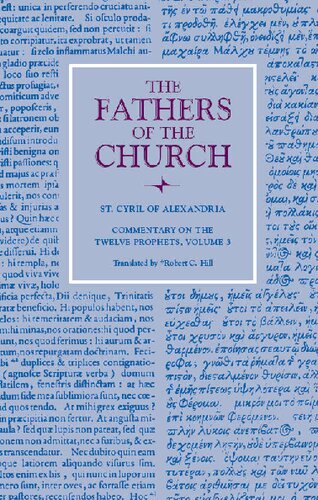

Most ebook files are in PDF format, so you can easily read them using various software such as Foxit Reader or directly on the Google Chrome browser.
Some ebook files are released by publishers in other formats such as .awz, .mobi, .epub, .fb2, etc. You may need to install specific software to read these formats on mobile/PC, such as Calibre.
Please read the tutorial at this link: https://ebookbell.com/faq
We offer FREE conversion to the popular formats you request; however, this may take some time. Therefore, right after payment, please email us, and we will try to provide the service as quickly as possible.
For some exceptional file formats or broken links (if any), please refrain from opening any disputes. Instead, email us first, and we will try to assist within a maximum of 6 hours.
EbookBell Team

4.8
44 reviewsThis final volume in a series of three contains Cyril's commentary on
Zephaniah, Haggai, Zechariah, and Malachi. Applying his knowledge of
ancient Israelite history in his analysis of the immediate context for
each of these prophetic books, Cyril believes that Zephaniah was
addressed to the residents of Jerusalem in the years preceding the
Babylonian Exile, and the other three were addressed to a newly
repatriated, post-exilic nation.
An emphasis on theodicy is a
primary theme of this book. God's love for humankind, says Cyril, is
expressed in the many warnings sent through the prophets and in the
ample amount of time that God allows for people to repent. When no
repentance ensues, God sends harsh but just punishments, employing the
brutality of enemy nations as his instruments, yet always doing so with
the loving purpose of returning his people to himself.
Cyril's
focus on the historical details of the Old Testament is matched by his
concern for the Church of his own day. Where the prophetic oracles
mention the Jewish priesthood, altar, or sacrifices, Cyril takes the
opportunity to exhort Christian priests to preserve their moral purity
and to fulfill their liturgical duties with devotion. This extrapolation
from the ancient to the contemporary, from Israel to the Church, is
compatible with the typological interpretation that Cyril utilizes in
conjunction with his literal, historical approach. The Temple is a type,
or foreshadowing, of the Church, and the sacrificial lamb of the
Passover prefigures Christ. Thus Cyril maintains his connection with the
Alexandrian tradition of allegorical exegesis while presenting a
balanced, multi-faceted interpretation that applies passages from many
other parts of the Bible to extract a wealth of meaning from the
prophetic books.